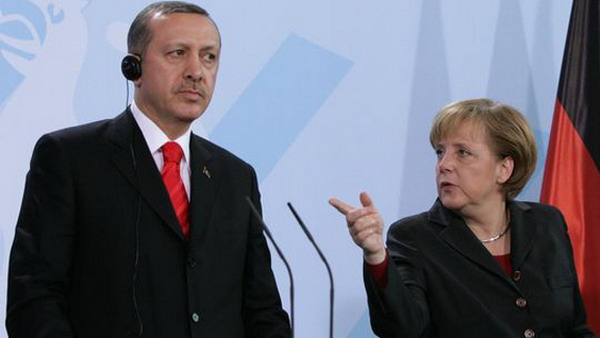The stance adopted by Germany and other European countries “attacking Turkey and President Recep Tayyip Erdoğan” is a reflection of Europe’s “narrowing horizon,” presidential spokesperson İbrahim Kalın said on Sept. 4. Hurriyet reports.
His comments came one day after a televised debate between German Chancellor Angela Merkel and her Social Democrat (SPD) challenger Martin Schulz ahead of the country’s Sept. 24 federal election, in which both candidates adopted a hardened tone over Ankara’s EU membership prospects.
Kalın tweeted that the fact that Turkey and President Erdoğan were dominant topics during the debate “is not a coincidence.”
“The fact that Germany and Europe are attacking Turkey and Erdoğan, disregarding their fundamental and urgent problems, is a reflection of Europe’s narrowing horizon,” he tweeted.
“The anti-Turkey thoughts in Europe have become a tool of relief through creating an enemy ‘other’ and postponing the fundamental problems,” he added.
“The fact that mainstream German politics has submitted to populism and otherizing-antagonizing will only fuel discrimination and racism,” Kalın said, adding that societies that “identify themselves through an enemy other will never find their own identity.”
He also claimed that it “does not much matter” who wins the German election, as the “mentality adopted to win the vote is obvious.”
“The fact that Merkel and Schulz never touched on discrimination and increasing racismthroughout the debate shows the point to which German politics has reached,” Kalın said.
“We hope this problematic atmosphere, which sacrifices Turkish-German relations to a narrow political horizon, will change soon,” he said.
During the debate, Merkel she would seek an end to Ankara’s membership talks with the EU, marking a shift of her previous position.
“The fact is clear that Turkey should not become a member of the EU,” Merkel said.
“I’ll speak to my [EU] colleagues to see if we can reach a joint position on this so that we can end these accession talks,” she added.
The German chancellor’s comments came after Schulz appeared to surprise her by vowing to push for an end to the negotiations if he was elected chancellor in the federal election.
“If I become German chancellor, if the people of this country give me a mandate, then I will propose to the European Council that we end the membership talks with Turkey,” Schulz said.
“Whether we can win over all the countries for this I don’t know. But I will fight for this,” he said.
Merkel initially cautioned against such a move, saying it would be irresponsible to endanger ties with Turkey at a time when German citizens are imprisoned there.
“I do not intend to break off diplomatic relations with Turkey just because we’re in an election campaign and want to show each other who is tougher,” she said.
But after the moderators had moved on and asked the two candidates a question about U.S. President Donald Trump, Merkel returned to the Turkey issue, suddenly throwing her weight behind an end to the membership talks.
Apart from Turkey, in their exchange on Trump and North Korea, Schulz accused the U.S. president of “bringing the world to the brink of crisis with his tweets” and said Germany should work with its European partners, Canada, Mexico and Trump’s domestic U.S. opponents.
Merkel responded by deploying her credentials as a global stateswoman, saying she had spoken to French President Emmanuel Macron about North Korea on Sept. 3 and would talk to Trump as well as leaders from Russia, China, Japan and South Korea in the coming days.
“I don’t think that one can solve this conflict without the American president,” she said.
“But I think one must say in the clearest terms that for us, there can only be a peaceful diplomatic solution,” Merkel said.
During the debate, Schulz also attacked Merkel for failing to coordinate a better European response to the refugee crisis in 2015, when her decision to open Germany’s borders to hundreds of thousands of refugees, many fleeing war in the Middle East, cost her support.
“The inclusion of our European neighbors would have been better,” Schulz said.
Merkel shot back: “We had a very dramatic situation then … There are times in the life of a chancellor when she has to decide.”
The German chancellor’s show of experience appeared to work with voters. She was some 14 points ahead of Martin Schulz in opinion polls before the debate. A survey by Infratest Dimap for ARD television showed her overall performance was viewed as more convincing by 55 percent, compared to 35 percent for Schulz.
The ARD poll showed that 49 percent of those surveyed viewed Merkel as being more credible, while 29 percent favored Schulz.



















































